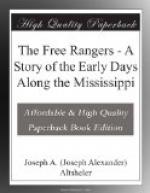“They tried to hold Paul a prisoner, and they’re not at war with us,” rejoined Sol. “We’ve got a right to hit back. Besides, we’re doin’ it to save a war, and we’re only borrowin’ their boat fur their own good.”
The two, without further ado, made a circuit around the Spanish camp, coming down on the northern side. There fortunately for them the trees and bushes were thick to the water’s edge, and the shore was very low. In fact, the river, owing to the flood, overlapped the bushes.
They redoubled their caution, using every art and device of woodcraft to approach without noise. They could see the flare of the camp fire beyond the bushes, and now and then they caught sight of a sentinel’s head. They felt amply justified in this attempt, for Alvarez had not only held Paul a prisoner, but was plotting with the Indian chiefs to slay all the white people in Kentucky.
“Here are the boats,” whispered Henry.
There they were, eight in number, large, strong boats, every one with several pairs of oars, and tied with ropes to the bushes.
The eyes of Shif’less Sol watered as he gazed.
“They look pow’ful good to a lazy man,” he said, “I could shorely sleep mighty comf’table in one o’ them while Jim Hart wuz pullin’ at the oars.”
“I think the small one at the end nearest to us would just suit our party,” said Henry; “although it has more, it could be handled easily with a single pair of oars.”
“Shorely!” said Shif’less Sol, “but how to git away with it is now the question.”
It was indeed a problem, vexing and likewise dangerous. A sentinel, musket on shoulder, walked up and down in front of the Spanish navy, and he seemed to be very wide awake. Moreover, two men slept in each boat.
“We must get that sentinel somehow,” said Henry, “not to hurt him, but to see that he doesn’t talk for the next half hour or so.”
“What’s your idea?” asked the shiftless one.
Henry whispered to him rapidly and Sol grinned with satisfaction.
“Good enough,” said the shiftless one. “It’ll work,” and he crept away from Henry deep in the bushes a little west of the sentinel. A moment or two later the Spaniard on watch was startled by a sharp, warning hiss from the edge of the thicket. He knew very well what made it—a rattlesnake, a thing that he loathed and feared. He certainly did not want such a deadly reptile sliding through the grass on his feet, and, clubbing his musket, he walked forward, looking intently for the venomous thing. He did not see it at first and all his faculties became absorbed in the search. Holding the clubbed musket ready for an instant blow he peered into the grass and short bushes. He was a Spaniard not without courage, but he was oppressed by the night, the wilderness, the huge river flowing by, and his feeling that he was far, very far, from Spain. Under the circumstances, the poisonous hiss inspired him with an intense dread and he was eager to slay. He leaned a little farther, swinging the musket butt back and forth, ready for a quick blow when he should see the target.




